Interview With Director General Kamei Haruko: Expanding Choices and Empowering Lives Is What Development Cooperation Is All About
2025.08.19
Director General Kamei Haruko joined the JICA Ogata Sadako Research Institute for Peace and Development (JICA Ogata Research Institute) in April 2025. We asked Kamei about the origins of her interest in development cooperation, her experiences at the JICA Nepal Office and how her work on gender equality became major turning points, as well as what she hopes to accomplish at the JICA Ogata Research Institute.
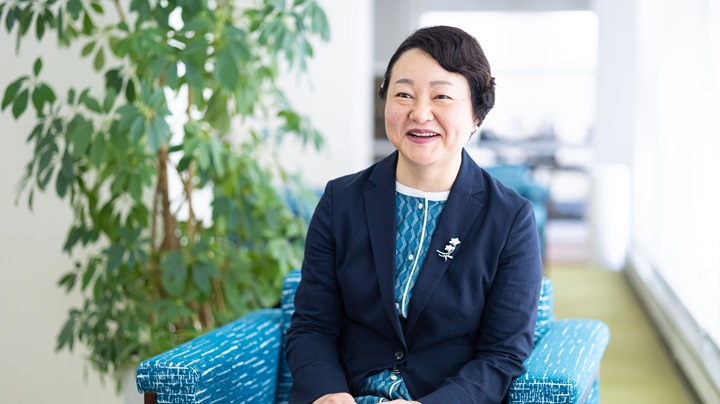
―What made you become interested in development cooperation? Please also tell us why you decided to move from a private company to JICA.
Ever since I was a child, I have been interested in various countries and their cultures. My father had many international business trips and I remember always looking forward to the gifts that he would bring home for me from different countries. I was especially fascinated by Latin America, India and other places that were not well known and considered exotic in Japan at the time. I was also deeply immersed in the world of books, so much that my place at school was the library. Again, this was because I was able to learn about the world through books. I really longed to visit places in this world that I did not know of.
My love of books led me to a job at a bookseller after graduating from university. There, I once got the chance to produce bibliographic data in the United States. As most of the books came from research libraries specializing in East Asian studies, we worked together with colleagues from China, Taiwan and South Korea. I really enjoyed this experience and started to wish to continue working with people from various countries. After returning to Japan, I came across a mid-career job advertisement by JICA in the newspaper. Hoping that I would be able to work in an even more unfamiliar world, I applied. To be honest, I did not have the desire to specifically work in the international cooperation arena from the beginning.
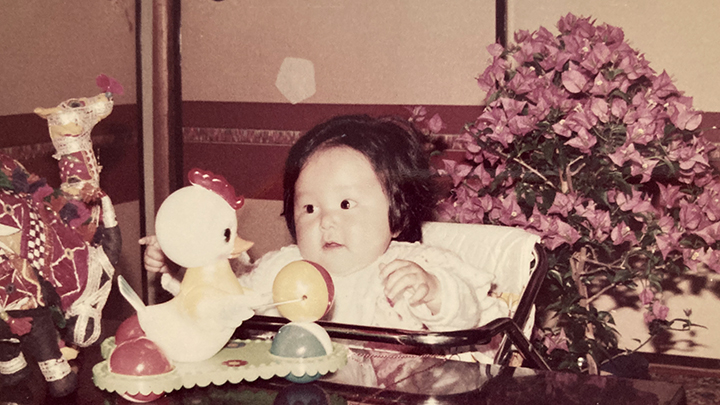
As a child, Kamei began to wonder about parts of the world that she had never visited, through gifts from overseas. She still keeps the doll given to her as a gift from India (far left).
―Through work at JICA, did your mindset toward development cooperation change?
Right after joining JICA, I did not have a clear understanding of development cooperation, as I was initially responsible for domestic projects. It was my three-year assignment to the JICA Nepal Office starting in 2001 that fully shifted my attention to development cooperation. While implementing projects in diverse fields, such as environment, industry and education, I witnessed firsthand how Japanese grant aid and technical cooperation were being put into practice on the ground. This experience truly made me recognize the value of working at JICA.
Nepal is a mountainous country and it was common for children to walk several hours along unmaintained mountain paths to go to school. This was also the case for adults who carried agricultural products to the market. Seeing this, I came to the full realization that there is a huge gap between what I had perceived as “the world” until then and the world in the eyes of the Nepalese. Whether it is education that children receive or employment that adults find, the people did not have a wide range of options to choose from to start with. This is why I realized that development cooperation, such as the improvement of school facilities or roads, has a role in making more options available for every person living there. What to choose from the greater number of options is up to the people. Ever since I realized this, my desire to continue working at JICA and to make more options available became stronger.
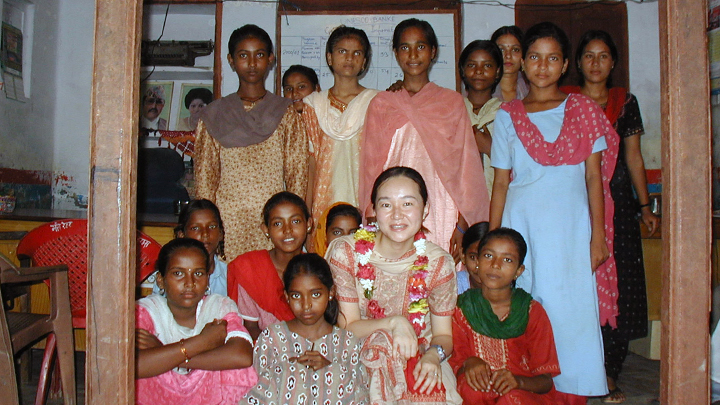
At the JICA Nepal Office, Kamei was in charge of the field of education and went around schools in Terai. (Front row, second from right.)
―Your experience at the JICA Nepal Office made you write the book “Paving the Way to the Future: Tracing 40 Years of Nepal’s Sindhuli Road” (provisional English title; available only in Japanese) in the publication series Project History .
Sindhuli Road connects Kathmandu, the capital of Nepal, with India. It is a lifeline infrastructure for the people of Nepal. 40 years after the initial idea conception and 20 years from the start of construction work, Sindhuli Road was completed in 2015. When I worked at the JICA Nepal Office, I visited the construction site and was astonished to see work taking place on mountain slopes so steep that road construction seemed like an impossible feat.
When I was assigned to the JICA Research Institute* in 2014, I decided to write a book about Sindhuli Road. As I conducted many preparatory interviews with people involved in the development of this road in Japan and Nepal, I realized that this was more than just road construction. By learning about the history, political background, the passion of those involved, people’s livelihoods and all other surrounding context, I came to believe that in terms of expanding options for the locals, no other infrastructure has produced greater impact than Sindhuli Road. Writing the book in the Project History series also taught me the value of studying projects from long-term perspectives.
*JICA Research Institute was renamed JICA Ogata Sadako Research Institute for Peace and Development (JICA Ogata Research Institute) in 2020.
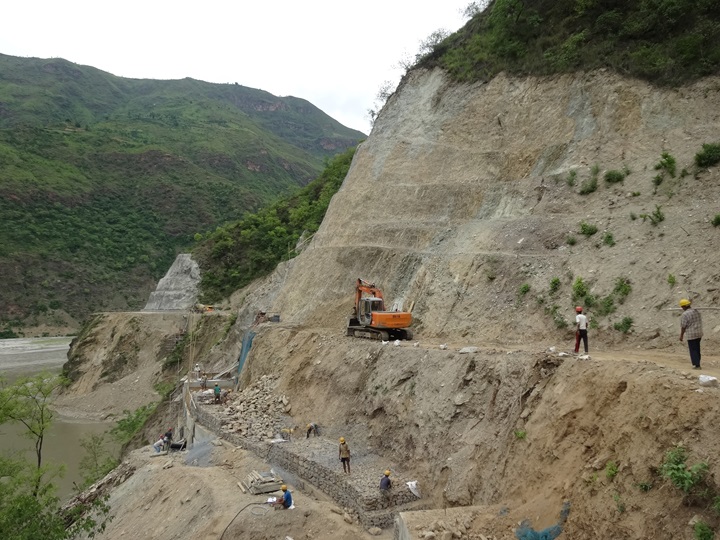
Before: Road construction on steep mountain slopes in Nepal
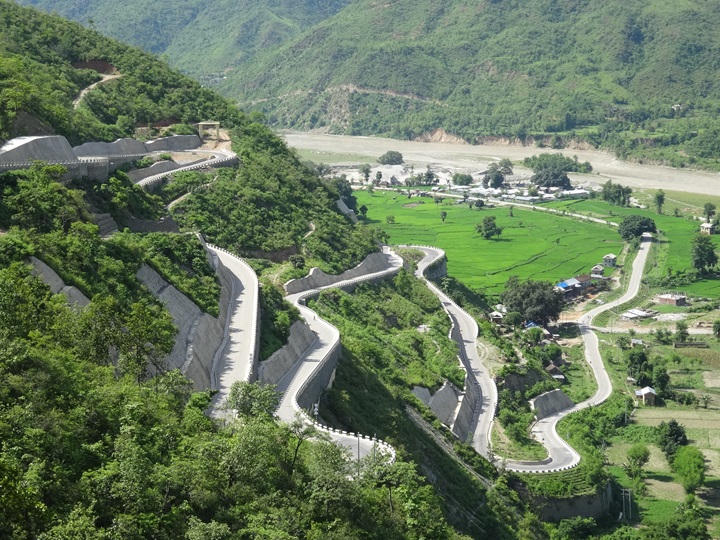
After: The completed Sindhuli Road, carved along the side of the mountain
―What experiences at JICA truly changed your perspective?
From making proposals in response to local needs during disaster relief activities to refreshing my understanding of Japan’s electoral system while helping other countries hold fair elections, I learned many new things through my work. The most unforgettable experience is my involvement in gender issues during my time at the Office for Gender Equality and Poverty Reduction of JICA. I originally did not have a strong interest in gender issues but working there made me realize how unaware I had been of gender bias and the gender gap.
As unconscious biases are deeply embedded in all societies—both in developing countries and Japan—it is particularly difficult to address gender issues. I do not think that it is an exaggeration to say that I now constantly see my life through a gender lens.
When we look at Japanese development cooperation, there is a lack of knowledge accumulation from gender-related studies. Further research is needed also from the perspective of human security , which aims to leave no one behind. Such studies should examine how gender issues have been positioned and addressed within Japan’s ODA policies, trace the changes that have taken place over the years, and assess the impact that Japanese development cooperation has had on gender equity.
―What are the roles and significance of the JICA Ogata Research Institute?
When implementing a project, we should ask ourselves whether what feels intuitively right is truly effective. I believe it is important to answer based on evidence. For example, when you see a crowded classroom in a developing country with only one teacher, you might immediately think that there should be more classrooms or fewer students per class. However, previous studies have shown that class size is not necessarily the most significant factor affecting learning outcomes in developing countries.
Research conducted by the JICA Ogata Research Institute since its establishment has produced valuable findings, especially in the field of education. One example is “Ecole pour Tous (EPT),” or “School for All,” a project that JICA implements mainly in Africa that aims to improve the school attendance rate of girls and academic performance through school management committees. The effectiveness of EPT has been demonstrated through impact evaluation . The proven results have been incorporated into the education policies of countries where EPT was introduced. When facing huge development needs with limited resources, research has a crucial role to play in showing how to move projects forward effectively.
―As Director General, what are you hoping to focus on?
I would like to further strengthen this flow of insight from research into JICA’s projects. I know from experience that when you are working on the ground in a project, you can often be overwhelmed with immediate tasks in front of you. Yet, as a professional of development cooperation, you would want to focus on your work while being certain that the approach taken by the project is truly effective and would lead to good results. I also aim to bridge the gap between development cooperation practice and our research work at the JICA Ogata Research Institute by creating a platform for active and meaningful dialogues.
JICA Ogata Research Institute is the sole institute in Japan that specializes in the study of development cooperation. Japanese development cooperation has many unique features and values. For example, JICA takes a collaborative approach by working alongside developing countries as a partner rather than pushing its ideas. By presenting such features and values as research-based findings that can be objectively assessed, the JICA Ogata Research Institute can go beyond intuitive discussion. By enhancing collaboration not only within JICA but also with thinktanks and research institutes within and outside of Japan, I hope to position the JICA Ogata Research Institute as a recognized hub for knowledge generation.

事業事前評価表(地球規模課題対応国際科学技術協力(SATREPS)).国際協力機構 地球環境部 . 防災第一チーム. 1.案件名.国 名: フィリピン共和国.

事業事前評価表(地球規模課題対応国際科学技術協力(SATREPS)).国際協力機構 地球環境部 . 防災第一チーム. 1.案件名.国 名: フィリピン共和国.

事業事前評価表(地球規模課題対応国際科学技術協力(SATREPS)).国際協力機構 地球環境部 . 防災第一チーム. 1.案件名.国 名: フィリピン共和国.

事業事前評価表(地球規模課題対応国際科学技術協力(SATREPS)).国際協力機構 地球環境部 . 防災第一チーム. 1.案件名.国 名: フィリピン共和国.

事業事前評価表(地球規模課題対応国際科学技術協力(SATREPS)).国際協力機構 地球環境部 . 防災第一チーム. 1.案件名.国 名: フィリピン共和国.
scroll